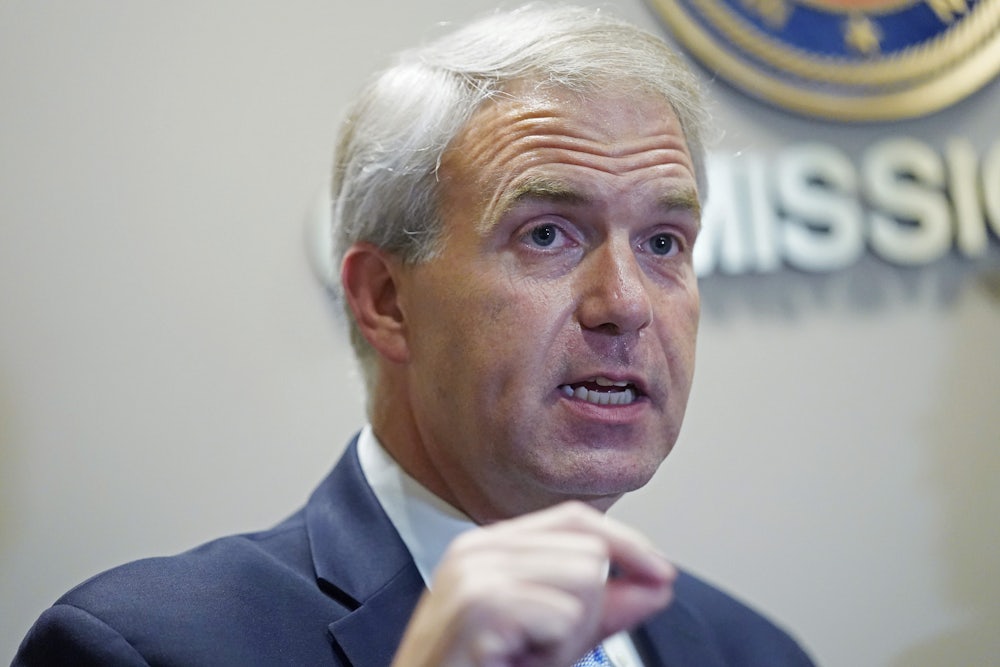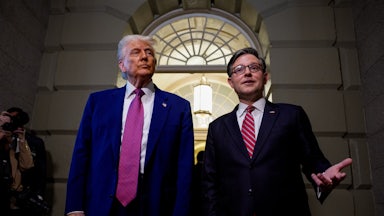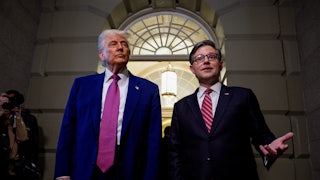Brandon Presley seems to have all the makings of a formidable candidate for governor in deep-red Mississippi. The 45-year-old is a lifelong resident (and former mayor) of the tiny town of Nettleton, with a deep Southern drawl to show for it. He’s ardently anti-abortion. He knows hard times: When he was 8 years old, his father was murdered, leaving his mother, a factory worker, to raise him alone. He already holds elected office, on the state’s utility regulatory commission. He even has a touch of celebrity, as a distant cousin to The King whose surname he shares.
There’s just one problem: Brandon Presley is a Democrat. Most years, that alone would be enough to disqualify him for consideration by a majority of voters. But 2023 is not shaping up to be a typical election year in Mississippi.
A January poll conducted by the Siena College Research Institute showed Tate Reeves, the politically hobbled 48-year-old Republican governor, leading Presley by just four points; 57 percent said they wanted “someone else” besides Reeves. A Tulchin Research poll last month instead put Presley in front by the same margin, leading the Cook Political Report to move its outlook for the race from “solid” Republican to “likely” Republican.
It’s enough to make some national Democrats daydream of victory. “I think Mississippi is the sleeper,” New Jersey Governor Phil Murphy, who chairs the Democratic Governors Association and the National Governors Association, told The Washington Post. “You’ve got a very unpopular governor who’s left a lot of the state behind, whether it’s water in Jackson or not expanding health or other services for folks who need it the most. And we’ve got a really credible, popular, high-name-recognition candidate.”
What in the world is going on in Mississippi? The state, whose last Democratic governor left office nearly two decades ago, is by some measures the most conservative in America. It only dropped the Confederate battle emblem from its state flag less than two years ago. Could voters there really send a Republican governor home in favor of a Democrat?
Brandon Presley has spent the last 15 years representing the northern district of the Mississippi Public Service Commission, which regulates the state’s telecommunications, electric, gas, water, and sewer utilities, ensuring customers are charged a fair price. In 2008, his first year on the commission, he pushed for its meetings to be broadcast live on the internet so residents across the state could watch from their homes. Since then, he has built a reputation as a plainspoken populist willing to fight Democrats and Republicans alike on behalf of working people.
When electric utility Mississippi Power began construction on a $2.9 billion “clean coal” plant in 2010, Presley bemoaned the Obama administration’s “heavy-handedness” in pushing for the commission’s stamp of approval. He cast the lone vote against the project, saying ratepayers should not be responsible for the “great risks” of unproven technology. Seven years later, when the commission forced the boondoggle’s closure, its cost had reached $7.5 billion and Presley led the charge to ensure the Mississippi Power’s 187,000 ratepayers didn’t foot the disaster’s bill. (Two years later, when it was rumored that the utility might ask the commission to approve a rate increase to help deal with some of the project’s debt, Presley warned that the utility would be “laughed out of the meeting.”) In 2013, when talk surfaced about then-Governor Phil Bryant being open to the state serving as a “nuclear waste recycling” site, Presley called the idea “appalling.”
This track record suggests Presley—who didn’t respond to interview requests for this article—isn’t motivated by partisan ideology but instead a concern for regular Mississippians of all stripes. That’s certainly how he would like voters to see him, judging from his campaign launch video.
Mississippi deserves leaders who fight for our families, children and workers rather than themselves and their rich friends. We deserve leaders who will never forget where they came from or who put them in office.
— Brandon Presley (@BrandonPresley) January 12, 2023
That's why I'm running for Governor of Mississippi. pic.twitter.com/hyQzrLX0X1
Republicans have responded with predictable dismissiveness. When Presley announced his candidacy on January 12, Frank Bordeaux, chairman of the state’s Republican Party, referred to him as “JV Jim Hood”—a reference to the last Democrat candidate for governor, a longtime state attorney general who lost to Reeves by a relatively narrow five-point margin. A GOP strategist in the state alluded to the parallels between Hood and Presley—both white Democrats with name recognition from north Mississippi—before noting that proof is always in the pudding. “It wasn’t there in ’19 with a similar type of candidate,” Austin Barbour told Politico.
While that’s true, Mississippi has been beset by unprecedented mismanagement and corruption in the three years since the 2019 election. Jackson is facing a water infrastructure crisis; parts of the capital went without water for weeklong stretches last summer, prompting Congress to launch an investigation into how the state is spending billions in federal infrastructure funds. The state’s hospital system is under extreme duress; the state health officer told lawmakers late last year that 50 percent of rural hospitals may soon be forced to close. And then there’s the scandal that the state auditor—a Republican—has called the largest public embezzlement case in the state’s 205-year history: the misuse of more than $75 million worth of federal welfare dollars, leading to indictments and guilty pleas (though none yet for Brett Favre). While investigators say the misuse occurred prior to Reeves becoming governor, he was criticized last summer after the state replaced a lawyer it had hired to recoup some of the money via a civil lawsuit. Reeves claimed Brad Pigott, the lawyer, was too politically motivated, while Pigott told Mississippi Today, “I am sure they can find a loyal Republican lawyer to do the work.” The welfare scandal, infrastructure problems, and hospital crisis have no doubt played a part in Reeves’s sinking popularity.
Presley has pounced, calling Reeves “a man with zero conviction and maximum corruption” and adding that he wanted to “build a Mississippi where we fight corruption, not embrace it.” After Reeves’s State of the State address in January, Presley delivered his response from inside a shuttered hospital in Newton, a town of roughly 3,000 people. “When Tate Reeves finally wakes up and asks why hospitals in Mississippi are closing, he should look in the mirror,” he said. Presley noted that the state could keep such rural hospitals open by choosing to expand Medicaid—an option created for states under the Affordable Care Act, but which Reeves opposes even as some Republicans have proposed a voter referendum. (The governor in January decried “Democrats and their allies in the media who are pushing for the expansion of Obamacare, welfare, and socialized medicine.” He allegedly has admitted in private that Medicaid expansion would be good for Mississippi, but won’t support it for political reasons.)
Reeves will eventually launch a counteroffensive, one likely to resemble the culture wars being waged by Ron DeSantis and other Republican governors. Case in point: Reeves recently signed House Bill 1125, which bans gender-affirming care in the state for anyone under the age of 18. (He did so with Matt Walsh at his side.) Reeves will also remind voters of his cuts to the state income tax (which he wants to eliminate entirely) and his state’s role in the Supreme Court case that overturned Roe v. Wade. (Reeves said he wants to make Mississippi “the safest place in America for an unborn child.”) But three longtime political observers in the state I spoke to said they expect Reeves to focus on painting Presley as a “socialist” liberal who’s out of step with Mississippi values and in cahoots with Joe Biden, Nancy Pelosi, and Alexandria Ocasio-Cortez. “It is a tried and true method,” said Marvin King, a professor of political science at the University of Mississippi, adding that this rhetoric will likely “erode any gains Presley makes in the short term.”
Presley may actually have some immunity against that line of attack, given his unassailable local roots, longtime opposition to abortion, and being “all in on the Second Amendment,” according to journalist Curtis Wilkie, who recently dined with Presley. (Presley is “no wild-eyed liberal,” Wilkie added.) Presley’s modest beginnings and openness about his personal struggles may also resonate with voters in the poorest state in the nation. Presley’s father was a roofer; his mother worked at a garment factory until it closed, then taught at a preschool. After high school, he attended a local community college before going on to graduate from Mississippi State University. Reeves, meanwhile, conducts himself with the amount of humility you would expect from the head of Mississippi’s six-figure “good ole boys” club. He grew up in a Jackson suburb and attended Millsaps College, a private liberal arts school in Jackson, where he studied economics. His father is the owner of a successful heating and air-conditioning business who donated $115,000 to Reeves’s first political campaign.
Reeves nonetheless is considered the favorite in the November election, given Republicans’ dominance in the state and the fact that Reeves, who has held statewide office for nearly two decades, has never lost an election. Presley, though, is not without a record of success. He became mayor of his hometown at 23. After two terms, he was elected to the Public Service Commission, where he has remained since 2008. Between then and now, more than 20 elected Democrats in the state have left the party, which dominated Mississippi politics from the days of Reconstruction until the dawn of the twenty-first century. But Presley has remained. David Baria, a Democrat who served in the state legislature from 2008 to 2020, said he believes Presley has remained with the party because “that is who he is, through and through,” meaning a believer in the old Democrat principle of defending the little man against big business—in the tradition of, say, Huey Long of Louisiana. But Steve Holland, who spent three-plus decades as a Democrat in the state House of Representatives and lives four miles from Presley, said it has less to do with ideology than where Presley hails from: the northeast Appalachian corner, a place of “Genesis people,” Holland said, meaning people who remember their roots while embracing the future.
No matter the reason, the D beside Presley’s name may be his biggest barrier to becoming Mississippi’s next governor. Glenn Antizzo, an associate professor in the Department of History and Political Science at Mississippi College, said that politics have become so tribal that even if Reeves has fallen out of favor with many Republicans, they more than likely will “come home” to the GOP while standing alone in the voting booth. “People just don’t want to see the other team win,” Antizzo said.
What would it take, then, for Presley to pull off an upset? The math is daunting. A Democratic candidate is virtually guaranteed a touch above 30 percent of the statewide vote. (A truck driver who ran a $3,000 campaign and passed on voting in his own primary came out with 32 percent of the vote in the governor’s race in 2015.) That means Presley must present a message that, while rallying his base, also pulls in about 20 percent of voters inclined to vote Republican. King noted that doing so takes a phenomenal candidate, one that Mississippi has not produced in 25 years. And that’s only the first tightrope of many that Presley must walk, political observers say.
Presley needs Representative Bennie Thompson, the only Democrat in Mississippi’s congressional delegation, to help drive up turnout in an off-year election, while at the same time realizing that, in the words of Antizzo, “Bennie Thompson’s brand is toxic for so many conservative voters in the state.” And although Presley’s attacks on big business might endear him to individual voters, it will likely scare corporations away from his campaign. “That’s a sword that cuts both ways,” said Tim Kalich, a Mississippi journalist who has watched state politics for decades. Reeves’s war chest is nearly $8 million, versus Presley’s $725,000. That gap will be hard to close, given that Presley is largely unknown in the lower half of the state, from Jackson to the Gulf Coast, where Reeves has performed best. Antizzo said Presley faces something of a catch-22: He needs money to increase his name recognition in southern Mississippi, but in order to raise that money he needs to be better known.
All of this explains why everyone interviewed for this story said Reeves is the heavy favorite. But every year brings at least one major electoral upset that shocks the pundits and data-crunchers, and there’s still a lot that could go wrong for Reeves this year to increase Presley’s chances of being that unicorn. At the very least, the race is compelling enough to keep the state’s political observers rapt. “I would not hesitate,” said Charlie Mitchell, a longtime journalist in the state, “to call this the most interesting race for governor in Mississippi in the last 20 years.”






